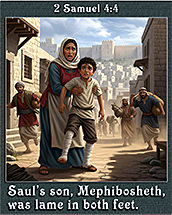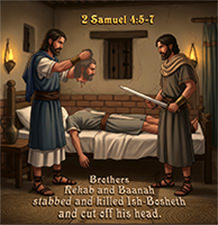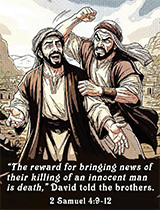2 Samuel 4:1–12 . . . Bible Study Summary with Videos and Questions
“Saul’s Son, Ish-Bosheth, Murdered”
Saul the king is dead, Jonathan the heir apparent is dead, Abinadab and Malki-Shua (Jonathan’s two brothers) are dead (1 Samuel 31:2), Abner the army commander is dead, and no other viable claimants or pretenders can block David’s accession to the throne except Saul’s son, Ish-Bosheth, and Jonathan’s son, Mephibosheth. In chapter 4, the author will remove both from the scene; one explicitly and the other implicitly.
[Note: Click the link to This Week’s Passage near the bottom of this page to read today’s Scripture.]
The Weakened Condition of the House of Saul (2 Samuel 4:1–4)
Sadly, Joab’s murder of Abner (detailed in Week 36’s summary) destroyed the hoped-for peace between the two kingdoms: the houses of Saul and of David. The author begins the next account with this text from chapter 4’s opening verse.
When Ish-Bosheth, son of Saul, heard that Abner had died in Hebron, he lost courage, and all Israel became alarmed (2 Samuel 4:1).
Clearly, Abner had been the essential supporter of Ish-Bosheth’s throne. Now that he was gone, the future of Saul’s kingdom appeared unpromising. Ish-Bosheth then lost courage. When he learned that the man who put and propped him upon the throne was dead, he knew that his day was almost over. He was weak because he’d trusted in “man” to gain his position. So when that man was gone, he knew his position would be soon gone.
The town of Beeroth (v. 3) was near the border of Benjamin, about two miles south of Gibeon (cf. Joshua 9:17). And Gittaim stood about 18 miles west-northwest of Beeroth, near the Israelite-Philistine border. Even though the Beerothites had fled from their town to Gittaim, and were still out of Benjamite territory when this account was written, the writer wanted to make clear that “Baanah” and “Rekab” were Benjamites (v. 2); Saul had been a member of the tribe of Benjamin.
We next get introduced to Mephibosheth, who was the son of Jonathan, David’s closest friend who died with his father on the field of battle. Mephibosheth (lit. “He Scatters Shame”) was the last male descendant of Saul who had a strong legal claim to Saul’s throne. At this time, he was only twelve years old and was lame.
Being weak because of circumstances beyond his control — his young age and the results of an unfortunate injury that came from the hand of another (see v. 4 for details) — he didn’t have the capacity to provide military leadership that would have been required of a king. (The author introduced the information in v. 4 here parenthetically to prepare us for what he’d write about Mephibosheth in chapter 9’s summary.)
Evidently, Mephibosheth’s condition emboldened his assassins to attempt their cowardly and ambitious plot. The repetition of the telling of Rekab and Baanah’s heinous act in vv. 6 and 7 stresses its atrocious, opportunistic nature.
Rekab and Baanah Murder Ish-Bosheth (vv. 5–8)
At this point, the author introduces readers to two brothers, Baanah and Rekab, military leaders under Ish-Bosheth from Saul’s tribe of Benjamin. The two decided to take advantage of the current power vacuum so as to gain favor with the new power: David.
Ish-Bosheth hadn’t gained genuine loyalty among his troops; they were loyal to him only when they thought he was strong and had a chance to gain and keep Saul’s throne. When Ish-Bosheth’s weakness became evident, Rekab and Baanah murdered him.
5Now Rekab and Baanah, the sons of Rimmon the Beerothite, set out for the house of Ish-Bosheth, and they arrived there in the heat of the day while he was taking his noonday rest. 6They went into the inner part of the house as if to get some wheat, and they stabbed him in the stomach. Then Rekab and his brother Baanah slipped away (2 Sam. 4:5–6).
We’re reminded in v. 2 that Rekab and Baanah were among of the children of Benjamin, which was Saul’s family’s tribe. This means that those who murdered Ish-Bosheth were fellow Benjaminite-family members.
Taking a “noon-day rest,” (v. 5), albeit a mid-day siesta during the heat of the day, wasn’t unusual then in that part of the world. But the absence of personal guards points to carelessness on Ish-Bosheth's part. To sleep at noon, without one or more guards, documents his false sense of security. He died therefore in his complacency or apathy, in keeping with his having lived that way all his days.
7b. . . After they stabbed and killed him, they cut off his head. Taking it with them, they traveled all night by way of the Arabah (2 Sam. 4:7b).
“Cutting off his head and taking it”: Such actions were an important part of their plan because they wanted to prove to David that they’d murdered his rival to the throne.
The brothers were opportunists who were completely unscrupulous. They used trickery to gain access to Ish-Bosheth’s house, stabbed him while he slept in his bed during a noonday rest, cut off his head, and would soon bring it to David as proof that they’d successfully killed his enemy for him. They’d hoped to receive a big reward from David for performing their bloodthirsty effort. Their problem was this: They don’t know David very well.
Rekab and Baanah proudly brought the head of Ish-Bosheth to David at Hebron. They told the king (v. 8b), “Here is the head of Ish-Bosheth, son of Saul, your enemy, who tried to kill you. And the LORD has avenged my lord the king this day of Saul and his descendants. This day, the LORD has avenged my lord the king against Saul and his offspring.” When they brought the severed head to David they apparently claimed, We’re God’s servants, defeating your enemies, as instruments of God. Their claim, that The LORD has avenged my lord the king, an act of shedding blood, presumed that God had approved the commission of their murderous deed, as though they’d acted on the LORD’s expressed orders.
Add to that their words, “Ish-Bosheth, son of Saul, your enemy.” David couldn’t relate to their comment because he didn’t think of Saul as his enemy. The beautiful song that David composed after Saul’s and Jonathan’s deaths shows that, although Saul set himself as an enemy of David, David kept from regarding Saul as an enemy.
While the two brothers were opportunists, David certainly wasn’t one. He wouldn’t stoop to questionable means to gain the throne that God had promised him. Neither did he look the other way when others had done evil to facilitate his ascent to the throne. He was a man who understood what being God’s king was to be all about.
David Orders the Execution of Rekab and Baanah (vv. 9–12)
Looking back, this wasn’t the first time that David had seen a severed head: He carried the head of Goliath around as a trophy for some period of time. But he knew that Saul and his descendants weren’t his enemy the way that Goliath was his enemy. And, even though Ish-Bosheth wasn’t the LORD’s anointed in the same sense Saul was, David had thoroughly learned to let God take vengeance.
9David answered Rekab and his brother Baanah, the sons of Rimmon the Beerothite, “As surely as the Lord lives, who has delivered me out of every trouble,10when someone told me, ‘Saul is dead,’ and thought he was bringing good news, I seized him and put him to death in Ziklag. That was the reward I gave him for his news! 11How much more — when wicked men have killed an innocent man in his own house and on his own bed — should I not now demand his blood from your hand and rid the earth of you!” (2 Sam. 4:9–11)
David’s designation of Ish-Bosheth as “an innocent or righteous man” (v. 11) implicitly denied him the title of “king.” Even though he was Saul’s son and therefore had a claim to the throne, he hadn’t been anointed as king. David’s treatment of the corpses of the two murderers and Ish-Bosheth (v. 12) also showed the people that Ish-Bosheth’s execution wasn’t an act that he ordered or approved.
Rekab and Baanah thought David would have been pleased to see the severed head of Ish-Bosheth. They underestimated David’s loyalty to God and the house of Saul. David was loyal to his pledge to honor and preserve Saul’s family and all his descendants. Therefore, he was outraged when the two brothers presented Ish-Bosheth’s head to him! After all, he’d slain the Amalekite opportunist who’d claimed to have killed Saul (as documented in Week 31’s summary). The brothers were guilty of “treason against their king.” This wasn’t an act of shedding blood while at war; instead, blood had been shed in betrayal and was by no means innocent. At David’s command, the men were slain; their bodies were mutilated and exposed publicly in the capital city. But Ish-Bosheth’s head was respectfully buried with honor in Abner’s tomb in Hebron.
David wouldn’t and couldn’t accept the brothers’ evil deed, even though it might have served a good purpose: unifying Israel under David’s reign as king. Clearly, David had a keen sense of righteousness when it involved kingship. He wouldn’t raise his hand against Saul, out of respect for the LORD who appointed him as king. He punished anyone else who took it upon himself to kill the LORD’s anointed. It didn’t matter that Ish-Bosheth hadn’t been anointed king by a prophet. He was an innocent son of the true king, the very king whom David had vowed to protect (1 Sam. 24:21–22).
Acting appropriately, David swiftly made an example of these murderous men. They weren’t soldiers fighting together with him for a just and God-honoring cause; they were, instead, murderers who deserved just punishment.
Thus, David acted in a hearty fashion, demanding strict justice in this case also. He not only proved to the people that he’d neither commanded nor approved of Ish-Bosheth’s murder, and that from heartfelt abhorrence of such crimes, he endeavored to keep his conscience void of offenses towards God as well as man.
With the death of Ish-Bosheth, no other viable candidate for king remained for the elders of the northern tribes. Meanwhile David sat in regal isolation, above the fray, as always, innocent of the deaths of Saul, Jonathan, Abner, and now Ish-Bosheth. The way had opened for his march to the throne of Israel... One cannot help but note the similar career of Jesus Christ, who now sits in regal isolation above the fray below, awaiting His universal acknowledgment as King.
† Summary of 2 Samuel 4:1–12
This twelve-verse passage details the assassination of Ish-Bosheth, Saul’s last surviving son to rule, after Abner’s death leaves his leadership paralyzed and all Israel alarmed (4:1). Seeing Ish-Bosheth’s weakness, two captains of raiding bands — Rekab and Baanah — plot and murder him in his own house while he is resting, beheading him and fleeing with his head to David at Hebron (vv. 2–7). The chapter briefly introduces Mephibosheth, the crippled son of Jonathan, who isn’t a threat to the throne (v. 4).
Rekab and Baanah present Ish-Bosheth’s head to David, claiming to have avenged Saul’s house on his behalf, but David rebukes them for committing such a wicked act and likens it to the Amalekite who claimed to have killed Saul, emphasizing that judgment follows those who shed innocent blood (vv. 8–11). David orders their execution for murdering a righteous man in his own home; their hands and feet are cut off and displayed publicly as a warning, while Ish-Bosheth’s head is buried honorably in Abner’s tomb at Hebron (v. 12).
Key points with verse references:
• After Abner’s death, Ish-Bosheth loses courage and Israel is thrown into turmoil (v. 1).
• Rekab and Baanah, captains under Ish-Bosheth, plot and murder him in his own house while he rests (vv. 2–7).
• Mephibosheth, Jonathan’s crippled son, is introduced as the only other remaining heir, but isn’t a rival (v. 4).
• Rekab and Baanah present Ish-Bosheth’s head to David, who condemns their deed as wicked (vv. 8–11).
• David orders their execution, displaying their bodies as judgment and buries Ish-Bosheth’s head with honor in Abner’s tomb (v. 12).
This account underscores the destructive result of faithless ambition and reaffirms David’s commitment to justice and the sanctity of God’s anointed.
This Week's Passage
2 Samuel 4:1–12
New International Version (NIV) [View it in a different version by clicking here; also listen to chapter 4 narrated by Max McLean.]
Summary Video: “The Second Book of Samuel”
† Watch this introductory video clip created by BibleProject on bibleproject.com.
- Q. 1 Why would Abner’s death cause Ish-Bosheth to lose courage (v. 1)?
- Q. 2 How does David’s treatment of one’s remains compare with that of Rekab and Baanah’s (v. 12)? . . . What does that say about David?



